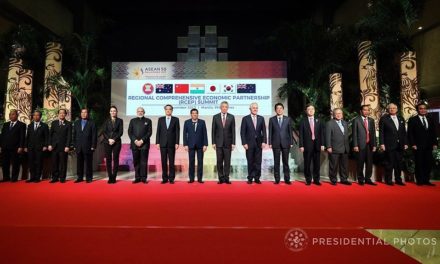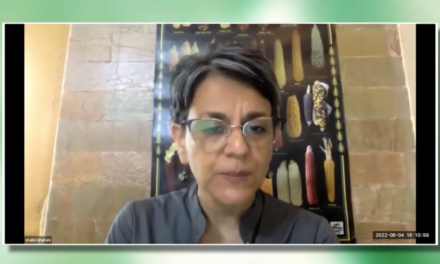There are two great superpowers in the world: the neoliberals and civil society, which is struggling an unjust economic and trading system manipulated by the United States that is causing problems and dislocations in most countries, leaving the majority in greater poverty. This system will be the target of political protests in Cancun, Quintana Roo, and other cities throughout the world in September by people seeking to derail the ministerial of the World Trade Organization (WTO), according to Walden Bello of Focus on the Global South, Martina Untermberger, of the Landless People’s Movement (MST), Blanca Chancoso of the Confederation of Indian Nations of Ecuador, and Peter Rosset of food First.
At a forum on the implications of the coming WTO meeting in Cancun for peasant agriculture organized by La Jornada and Casa Lamm, Blanca Chancoso told the audience about the hopes of the Ecuadorian people at the time of the assumption of presidential power by Lucio Gutierrez: "We got to know him in 2000, and we made an alliance with him so as to orient his policies toward the people. But Gutierrez began to move away from the people, from his convictions, from what he believed in, and began to collaborate with those in previous governments that were responsible for the current crisis. He has become the peon of the business elite and the United States."
For her part, the Brazilian Martina Untermberger of the MST stated, in response to a question from the audience, that the presidency of Lula (Luis Inacio da Silva) is a product of the struggles of labor and the hopes of millions of people, and that these hopes remain alive. While there are those in the current government who favor the cultivation and production of genetically altered foods such as the current minister of agriculture, "others are fundamentally on the side of the people." And to leave no doubt as to how Lula came to power, she underlined that it was "through an electoral process, through our vote."
"We realize that the government of Lula is being disputed," she added. "We hope that we will have time to organize ourselves and we are now in that phase. Today, 97,000 are organized demanding land reform, and we have the usual struggle over land–not in order to sell it but to live on it. We know that unless we sustain the necessary mobilization and a strong organization, it will be difficult to maintain the government’s interest in our hopes. Our expectation is that great struggles lie ahead, although the economy has declined in the last six months and we are in a process of deflation…But we are seeking not revolution but changes."
Walden Bello of Focus pointed out that the foreign exchange policy of Geroge W. Bush are similar to those of Ronald Reagan, who not only saw it as the solution to the trade deficit of the United States but also as a mechanism of economic recovery. He recounted how Reagan pushed the devaluation of the dollar vis a vis the Japanese yen, and how this became the key factor behind the recession in Japan, which has lasted over a decade, and provoked recession in the German economy as well.
He explained: "Washington’s thinking then and now is the same: to lift the US out of recession, manipulate the value of the dollar in order to drastically open up the markets of other countries to the United States. At the same time, the strong currencies of competitors become a barrier against imports since they encourage American consumers to buy American products."
He continued: "That policy has its own contradictions because it weakens markets to which the US may wish to export sooner or later to keep up its growth. Demand contracts in those economies and exporting to them becomes difficult to sustain. The weak dollar policy is always a short-term policy."
After Bello, Peter Rosset of Food First praised the resistance of the Iraqi people and, like Bello, he thought that Iraq has become another Vietnam for the United States. We may sigh with relief since Iraqi resistance has made the US think twice before invading Cuba, Syria, Iran, Venezuela, Colombia, North Korea, all of which were on the list for future invasions."
He added that demonstrations against the WTO ministerial will take place in other parts of the continent. Peasant organizations would block borders between Mexico and their countries. They would block roads saying that if it is free trade you want, then we will halt the movement of goods for the duration of the meeting allowing only the movement of people."
In the United States, he said, there would be protest actions in California, Arizona, and New Mexico.








